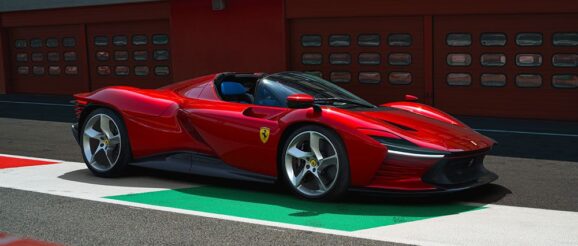‘Imagine Toyota putting a billion cars worldwide into the trash compactor just because they haven’t been electrified’ – Ferrari boss puts faith in “innovation, engineering, science and technology” to keep internal combustion engine relevant and viable

Petrochemical giants including ExxonMobil, Petrochina, Sasol and Shell, not to mention carmakers like BMW, Porsche and Toyota are making substantial investments in the development of carbon-neutral synthetic fuel to keep the internal combustion engine (ICE) alive.
And there’s another significant automotive name whose future product strategy takes in a mix of powertrains including pure-electric, hybrid and… ICE. And that’s none other than Ferrari.
The iconic Italian brand has built much of its global reputation on the back of the fabulous engines that power its exclusive, high-performance cars.
Yet, Ferrari plans to launch its first battery electric vehicle (BEV) in 2025 on the way to carbon neutrality by 2030, and when asked about the company’s connection to internal combustion and the potential impact of a further shift towards electrification Ferrari Australasia President, Jan Hendrik Voss, told CarsGuide: “I have all the faith in innovation, engineering, science and technology. There will be solutions for those (ICE) cars.
“Imagine Toyota putting a billion cars worldwide into the trash compactor just because they haven’t been electrified.
“We’re working with different partners, of different sizes, in different regions to come up with the best solution. But I can’t say that’s necessarily a unique Ferrari solution or an industry solution.

“I think the (Ferrari) CEO (Benedetto Vigna) has said that also in other public interviews,” he said.
In fact, speaking at the Financial Times Future of the Car Conference held in London earlier this year, Signore Vigna was decidedly upbeat about the future of e-fuels.
On the EU’s concession that ICE vehicles can continue to be sold if they run on carbon-neutral fuels, he said: “The discussion that was happening a few weeks ago about the adoption of e-fuel. I thought that this would happen in 2025 or 2026. Now it has happened two years before.

“This approval of the European Union was very, very good for us. For us and for the world, I believe, because it gives life to a technology that still has a long way to go. There are many things that can be done in terms of efficiency [and] emissions.”
Mr Voss agrees, saying: “Ferraris are like diamonds… forever. And between biofuel, things that can accommodate the existing engine, or retro-fitting things, there will be technological solutions to do right by the environment and right by the client who has a passion for driving these cars.
“We’re not the only ones that have a desire to keep our products alive. And I think even in terms of the drivetrain strategy, once the electric Ferrari comes out in late 2025, we will offer hybrid internal combustion engines and electric and let the customer decide,” he said.
